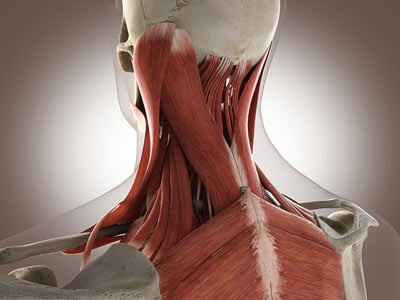The team of experts at Pain Management NYC works to relieve you of your neck muscle spasms by developing the best treatment plan. The goal, as always, is to get you back to your active lifestyle and avoid future pain as quickly as possible. Through careful monitoring, extensive testing and thorough examination, the best muscle pain specialists in NYC identify the source of your discomfort and devise a treatment plan suited to your specific needs.
Your neck has an important job. It’s responsible for holding up a bowling ball-sized form on the top of a thin stalk. Because of its rather precarious design, you can easily injure your neck. You may suffer pain and muscles spasms due to wear-and-tear or from an accident. Additionally, poor posture, a sedentary lifestyle and constantly looking at electronic devices all set the stage for possible discomfort and muscle spasms in the neck.
Occasionally, muscle spasms and pain in your neck can be indicative of more serious problems. If your pain comes on suddenly and is sharp and shooting into your shoulder, you’ve got a problem that’s worth going to the doctor. If your pain is accompanied by numbness and severe weakness, get medical assistance as quickly as possible at the top pain clinic in Manhattan to prevent permanent damage to nerves and other organs.
Causes of Neck Muscle Spasms
The biomechanics of a heavy object — that is, your head — resting on a flexible object such as your neck are awkward and precarious. Many different injuries and conditions can lead to neck pain, numbness and weakness. Then, you‘ll need neck muscle spasm treatment. Some of the conditions that cause muscle spasms in your neck include:
- Injuries. Auto accidents, especially if you’re rear-ended, are among the leading causes of pain and muscle spasms in the neck. Any time your neck or head is suddenly jerked backward or forward, the soft tissue can be damaged, leading to myofascial neck pain.
- Diseases. If you’ve been diagnosed with meningitis, cancer or rheumatoid arthritis, you may find your neck muscle spasms increasing.
- Osteoarthritis. As you age, your joints become susceptible to wear-and-tear. The deterioration of the cartilage in your vertebrae can lead to bone-on-bone rubbing, inflammation, grinding and crackling noises in your neck.
- Muscle sprain or strain. Repetitive motions — such as using the phone, grinding your teeth, reading in bed or staring at a computer screen — can strain delicate muscles.
- Compressed nerves. Damage to your neck can lead to herniation or leakage of the jelly-like disc between two vertebrae. As this cushion deflates, nerves located inside the spinal column can become compressed, causing neck muscle spasms.
- Disc degradation. A common source of neck muscle spasms in seniors and a leading cause of neck pain, degeneration occurs after years of wear-and-tear on your neck tissues.

Symptoms of Muscle Spasms in the Neck
The symptoms of muscle spasms in the neck are recognizable to most people because of the heavy workload your neck does every day. Still, common symptoms include:
- Headaches from chronic tension
- Decreased flexibility
- Pain, especially when you keep your head in one position for a long period of time
- Tightness
- Twitching
Though most neck muscle spasms calm with home treatment of rest, ice and over-the-counter pain medication, consult your doctor at Pain Management Center New York if your pain:
- Feels severe and sudden
- Spreads into your arms and legs
- Is accompanied by numbness, weakness or a severe headache
- Continues for several days without any noticeable relief
Diagnosing Neck Muscle Spasms
As with most pain conditions, discuss your complete medical and family history with your NY pain management doctor. He examines you to determine weakness, tenderness and neck strength. He also sees how flexible your neck is during or after your muscle spasms.
Although neck muscle spasms often can be diagnosed with a physical exam alone, your doctor may order additional tests such as x-rays, CT scans, MRIs or blood work to rule out any possible infections. Nerve tests such as an electromyography reveal if there’s any nerve damage.
Muscle Spasms in the Neck Treatment
Once your doctor rules out any serious complications, most forms of neck muscle spasms respond well to home treatments within a few weeks. Hot and cold packs, gentle stretching and rest all help your neck muscles relax and heal. If home treatment isn’t successful, however, your pain management doctor in Manhattan has many other treatment options available, including:
- Physical therapy, to strengthen neck muscles, restore flexibility and ease discomfort
- Prescription medications, such as muscle relaxants, anticonvulsants, tricyclic antidepressants and short-term narcotics
- Specialized transcutaneous electrical nerve stimulation (TENS) units, which send minor electrical signals to tender tissue to interrupt your pain and stop the spasms
- Careful and monitored traction, using weights, an air bladder or a pulley-system to gently stretch and support the neck muscles that may have clamped down
- Neck collars or brace, which provides support by taking the pressure of the weight of your head off your neck muscles, giving them some healing time
- Injections of pain blockers and steroids, to provide relief and reduce inflammation
- Minimally invasive surgery, to relieve spinal cord compression or nerve root pain — performed only after all other measures have failed to reduce your discomfort substantially
The best myofascial neck pain and neck muscle spasms treatment includes tips to prevent further discomfort or damage. Some of the best ways to avoid neck muscle spasm treatment is to adjust your environment to minimize future pain. Some suggestions include:
- Avoiding carrying heavy bags with thin straps
- Holding your phone properly, not tucked under your chin
- Using good posture techniques, including ergonomic positioning of your computer, desk and chair
- Taking frequent breaks
- Avoiding smoking
- Getting good sleep in healthy, stress-free positions
Prevention is the best remedy, but if you’ve got muscle spasms in your neck already, contact Pain Management NYC for the best care, which includes an accurate diagnosis and the most appropriate form of treatment.

Leon Reyfman, MD, is a top-rated, best-in-class interventional pain management doctor. He is a nationally recognized pain relief specialist and is among the top pain care doctors in New York City and the country. He is an award-winning expert and contributor to prominent media outlets.
Dr. Leon Reyfman has been recognized for his thoughtful, thorough, modern approach to treating chronic pain. He has been named a “top pain management doctor in New York” and one of “America’s Top Doctors™” for advanced sports injury treatments. Among other accolades, he was voted by peers as a “Castle Connolly Top Doctors™” and “New York Super Doctors™”. Dr. Leon Reyfman was a part of the medical team at the 2016 Summer Olympic Games in Rio de Janeiro, Brazil.
